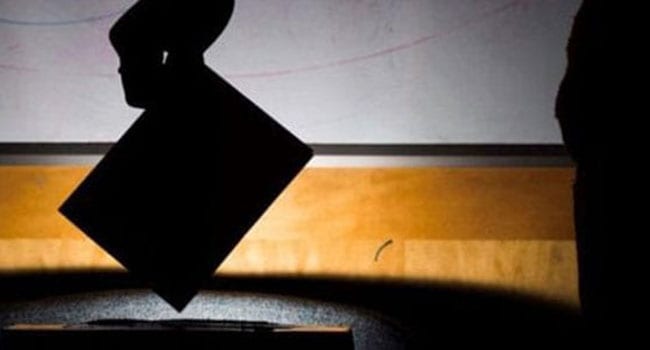 We’re in the midst of a mail-in referendum in British Columbia that could dramatically change – and not for the better – how democracy does or doesn’t work in the province.
We’re in the midst of a mail-in referendum in British Columbia that could dramatically change – and not for the better – how democracy does or doesn’t work in the province.
We should really suspect that something is wrong with the proposed changes when people from both major political parties are opposed to the initiative, which is being voted on by postal ballots that must be returned by Nov 30. The B.C. Liberals are strongly urging a No vote and three former B.C. NDP premiers have come out against proportional representation.
Glen Clark, one of those former NDP premiers, feels that those elected under proportional representation would be neither accountable nor representative. Ujjal Dosanjh worries that the referendum allows a very small minority of the population of B.C. to generate very major change. And the late Dave Barrett expressed opposition to proportional representation (PR) when the issue was raised way back in 2005.
Ian MacLeod is a retired lawyer with a long and distinguished career both professionally and in community service related to public policy. He has been awarded the Canada 125 medal and the Queen’s Golden Jubilee medal for this work. Here are his thoughts on proportional representation and the referendum:
“The proportional representation (PR) referendum before B.C. today must be defeated, both due to the rigged and deeply flawed process and on the long-term damage a yes vote would do to B.C.
“First, the process is rigged and fatally flawed, and fails on at least three counts:
- A pig in the poke: Unlike 2005 and 2009, there was no real consultation as to the options. If we vote Yes to PR on this incomplete package, we then have to choose from three options without the real and meaningful details (size of ridings, number of members per riding, method of selecting PR “top-ups,’ etc.) – a real pig in the poke.
- A rigged choice: It’s rigged to support the extorted deal with the Green Party. PR is the only option offered, not surprisingly, the one most suited to the Greens. The Greens have never earned more than 17 per cent of the popular vote (averaging about 11 per cent over the past five B.C. elections), but believe that should entitle them to seats and perhaps, like now, a disproportionate balance of power.
- As few as perhaps six per cent of eligible B.C. voters could fundamentally change B.C.’s electoral system: There are no minimum thresholds of votes, whether by total responses or regional distribution, required to have a so called binding vote on the new, foggy, PT model. That is problematic in three ways:
“If only 30 per cent of eligible voters respond (not inconceivable, as mail-in votes have notoriously low response rates), 15 per cent plus one of eligible voters will fundamentally change the structure of our voting system and impose PR on everyone else, without even knowing the model.
“If the Lower Mainland votes yes and the rest of the province no, the rest of the province is screwed, being swamped by the higher population in the Lower Mainland.
“If only 15 per cent plus one succeed in imposing PR, marginally over one-third of those (i.e. slightly over five per cent of eligible voters!) could impose one of the three un-detailed options on the whole province (ironically, akin to a perverse FPTP or first past the post on the option).
“This is not fair, not reasonable and could have dangerous repercussions.
“Second, as to substance, and with apologies to David Letterman, here is a Top 10 List of why PR would be a terrible choice for B.C:
- PR is not about good government, but rather about single issue, ‘me first’ advocacy: Normally, political parties try to build consensus in order to get as wide as possible support in order to run as a government in waiting. However, PR promotes ‘me first.’ The “my vote doesn’t count” argument is bogus, unless one believes also-rans deserve participation medals. It’s bizarre that parties attaining maybe only 10 or 15 per cent of the vote, and being even third place or worse finishers, could be granted seats that may give them the balance of power – 85 or 90 per cent of the voters did not vote for them!
- PR nearly always leads to minority governments and backroom deals and prostituted power: Throughout the world, 87 per cent of governments under PR are coalition, minority governments. Only 23 per cent with FPTP are. Those coalition minority governments only exist due to backroom, often extorted deals that favour the single issue party’s interests, not the electorate at large. They can win a few seats, then the larger parties prostitute their seats for power. For example, look at the disproportionate power of religious conservatives in Israel.
- Paralysis in forming governments. In addition to the backroom deal making and increased costs, paralysis can never be viewed as leading to “good government. In spite of the positive spin put on in by PR supporters, PR is not always wine and roses. For example, recently Germany, New Zealand, Sweden and others had hung parliaments; in 2010, it took Belgium 541 days (18 months!) to form a government; Italy has had 62 governments in 72 years; in New Zealand, the sitting prime minister went on maternity leave, and the unelected, PR-appointed deputy prime minister, headed the government for six weeks.
- PR can allow fringe (even fascist) parties to establish, and then build on, a PR toehold. Looking at Europe today, this is not fear mongering. In Sweden, a far-right party has just ‘earned’ the balance of power. Likewise in Germany, Austria, Hungary, Poland and Italy. Looking to history, between 1918 and 1939, 15 PR European countries (including Germany, Italy, Spain and Greece) fell to dictatorships. No FPTP countries did. Scarily, today, many western democracies are paralleling the 1930s, with growing nationalism, trade barriers and right-wing parties, feeding on PR seats. It can happen again!
- Voter representation and MLA accountability are diminished: PR members will likely be chosen from party lists as, by definition, they will not have received the most votes in any riding. Their first loyalty will always be, and has to be, to the party appointing them, not to the constituents (who did not directly elect them).
- Voter representation and MLA accountability are diminished: To make room for PR members without a huge increase in the number of MLAs (although there will be some), ridings will be much bigger and multi-member (yet again, no details – just ‘trust us, we’re the government’). Under the model B.C. rejected in 2009, Princeton would have been in the same riding as Quesnel, 550 kilometres away. How can an MLA ever know or properly represent such a large and diverse area?
- Voter representation and MLA accountability diminished: As above, those larger ridings will be multi-member – between two and seven MLAs, from different parties (yet again, ‘trust us’). That means that those MLAs could well be working at cross purposes. Worse, on any unpopular issue, they can avoid accountability by passing the buck to the others.
- Debt and taxes will certainly go up: In all likelihood, PR in B.C. will add up to 10 additional MLAs (another one of those pesky details on which we will have to trust the NDP/Green government), each one with a staff, Victoria and constituency offices, salaries, expense accounts, pensions and so on, again, paid for by the taxpayer.
- Debt and taxes will certainly go up: PR jurisdictions typically operate with coalition governments, leading to significantly more elections. Each election in B.C. costs about $45 million, paid for by the taxpayer, each time.
- Debt and taxes will certainly go up: Minority governments under PR systems, buying off the fringe parties, spend substantially more (on average, 30 per cent of gross domestic product versus 24 per cent), driving up debt and taxes, a lot!
“If we must change, let’s start with a fair and open discussion, like in 2005 and 2009 – not this rigged and undefined process.
“In the meantime, first past the post has generally given B.C. stable governments for 146 years. It may not be perfect, but it is better than all the others (to paraphrase Winston Churchill, on democracy).”
If you have not yet mailed in your ballot, please do so. You need only make one mark to retain the current system. You don’t have to answer the second question about ranking the three bad alternative systems.
Remember, if you don’t vote, you lose your right to complain about the results and the results could be bad.
Troy Media columnist Roslyn Kunin is a consulting economist and speaker.
The views, opinions and positions expressed by columnists and contributors are the author’s alone. They do not inherently or expressly reflect the views, opinions and/or positions of our publication.
